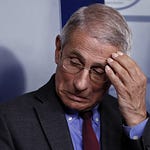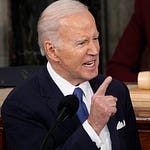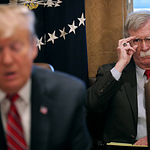Full Transcript:
Larry Bernstein:
Welcome to What Happens Next. My name is Larry Bernstein.
What Happens Next is a podcast where the speaker gets to present his argument in just Six Minutes and that is followed by a question-and-answer period for deeper engagement.
Today’s discussion will be on the acquittal of Hillary Clinton’s lawyer Michael Sussman and a movie review of the new Top Gun Maverick film.
Our first speaker today will be Sean Berkowitz who successfully defended Michael Sussmann of felony charges that he lied to the FBI about the Trump investigation. Sean will give us the inside look from the defendant’s perspective. Sean is an old friend of mine. We attended Hebrew School together and we were opponents in high school debate tournaments. Sean claims he won. Sean is also famous for being the special prosecutor in the Enron trials.
Our second speaker will be Robert Young who is a retired air force pilot. Youngster Aka Farmer will discuss the new blockbuster film Top Gun: Maverick! I want to learn how Top Gun has influenced a generation of fighter pilots and our military men and women in uniform.
Our final speaker will be Darren Schwartz who is one of my golfing buddies. Darren is the new What Happens Next movie critic, and he will provide a humorous take on Top Gun Maverick. Buckle up!
Sean Berkowitz
Topic: Sussmann Not Guilty!
Bio: Sussmann’s lawyer and Litigation Partner at Latham & Watkins
Opening Remarks
My name's Sean Berkowitz, I was the attorney for Michael Sussmann in the recent prosecution by John Durham, the special prosecutor appointed by then-Attorney General Barr. I just want to make clear that the comments I'm about to give are my own and not my clients, and I'm also speaking, based on the public record, not on anything outside of the public records. That's for a couple reasons, including attorney-client information as well as the fact that there was a fair amount of classified and secure information that was accessed during discovery.
I want to talk about three things. Why did this prosecution happen? What happened at the trial and what the implications are?
Why did this happen? John Durham was appointed as a special prosecutor in October of 2020, shortly before the election between Biden and Trump. He had previously been assigned an investigation by Attorney General Barr into allegations made by Trump that the FBI and other individuals had created a hoax or a conspiracy of Trump's connections to Russia. Some people at the time said that he was investigating Mueller's investigation.
When the election was coming up, Barr wasn't certain who would win, and he wanted to appoint Durham as special counsel, which would make it difficult for Biden's attorney general to fire Durham.
And for years, John Durham conducted this investigation that was fairly wide-ranging. My role was relatively limited, I represented Michael Sussmann, who was an attorney at Perkins Coie. Michael Sussmann is a nationally-renowned, cybersecurity and data privacy expert who had done some work in connection with the election. He was not the main point of contact for Hillary Clinton's campaign. His law firm Perkins Coie was her outside general counsel, but Michael Sussmann's role was relatively limited.
The special counsel investigations, was far and wide and they weren't coming up with anything. They ultimately came up with the allegations that Michael Sussmann lied to the general counsel of the FBI, when he brought the FBI certain information showing potential connections between Trump and Russia and that he was not acting on behalf of any particular client.
The special counsel looked into those issues and found that Mr. Sussmann did bill a substantial amount of time to Hillary Clinton's campaign and concluded that he was attempting to pass these allegations off as a concerned public citizen rather than on behalf of the campaign. And they indicted him in September of 2021.
My own personal view as to why they charged him was that they were having trouble telling their story in a public forum, and although the charge against Mr. Sussmann was fairly narrow, lying to the FBI, they were able to in a 25-page indictment tell a wide-ranging political conspiracy that fit the narrative that Hillary Clinton and others working at her behalf were attempting to create a false narrative of Trump's connections to Russia.
And so that set up the battle for the trial.
The government's case consisted largely of Jim Baker, the general counsel of the FBI testifying as to what Mr. Sussmann allegedly told him, information related to the FBI's investigation into the allegations, as well as the connections between Mr. Sussmann and Hillary Clinton and her campaign. Mr. Sussmann did not testify, and the jury was out about six hours, and quickly determined that the government had not met its burden of proof, proving that Sussmann had lied to the FBI.
The key issues in the trial were as follows. Number one, Mr. Sussmann told the FBI that he was not acting on behalf of a particular client when he was providing the information, that Mr. Sussmann had gotten the information from a client of his who was a cyber expert, that the information showed potential connections via DNS links to a Trump server and a server associated with Alfa Bank, which is a Putin affiliated entity.
Mr. Sussmann and his cybersecurity expert client, Rodney Joffe, went to the New York Times Pulitzer Prize-winning journalist named Eric Lichtblau, who indicated that he was to run a story. Mr. Sussmann and his client went to give the FBI a heads up. The FBI went to the New York Times after learning this information and asked to hold the story while they investigated it. The New York Times held the story, the FBI investigated it, and later told the New York Times they didn't think that it was substantiated or there were innocent explanations. The New York Times ended up not running any story. Another news organization about a month later, Slate ran a story that talked about the potential connections.
Sussmann had a client, but he wasn't there representing any clients' interests, that although he billed time to Hillary for America and the story that would have appeared in the New York Times would have benefited Hillary for America. All three witnesses from Hillary for America testified that they were not aware that Sussmann was going to the FBI, they didn't authorize him, and going to the FBI would've been against their interests.
The government was left with a largely circumstantial case that Mr. Sussmann had lied when he said he wasn't there on behalf of a client. The final piece of the of the trial was the FBI's investigation, which was in my own view, a joke. Within a couple hours of getting the information, they largely discounted the allegations. Nobody ever interviewed Sussmann, nobody ever interviewed the cyber expert that had provided him the information. The individuals who looked into this at the case agent level were denied who the source of the information was.
Both Democrats and Republicans have claimed some implications arising out of this that are reported in the press. The Republicans have said that the case was essentially dead from the start because of the jury pool in DC. Democrats have said this vindicates Hillary Clinton and Trump has tweeted that this makes him more likely to want to run for President because of the information that came out of trial.
My own view is that it shows our jury system works. This was a case that shouldn't 've been brought. It was a politically motivated prosecution that was designed to use Sussmann to tell a broader conspiracy and that's inappropriate. And thankfully, the jury listened to the evidence, and they did what juries typically do, which is get it right and acquitted him.
Sean Berkowitz transcript:
Robert Young
Topic: How Top Gun Influenced the US Military
Bio: Retired U.S. Air Force Pilot
Opening Remarks
[On why Robert Young joined the Air Force]
I had my private pilot's license, junior year of high school, long before some of my friends even had their driver's (laughs) license. I was involved in general aviation flying up at Hanscom Air Force Base, and we'd see Weekend Warriors. The first airplane I ever saw there was a C-5. I'm like, "Wow. Anybody who must fly this has got to be the best pilot in the world," and, three weeks later, a pair of F-16s pulled in, and, staring at these, just Ferraris. I was fascinated by the fighter jet and watching Top Gun fueled that idea that, "Wow, you want to fly fighters if you want to be a real pilot," That was transformative.
Robert Young transcript:
Darren Schwartz
Topic: Reviews Top Gun: Maverick!
Bio: Newly Hired! What Happens Next Film Critic
Opening Remarks
[On the relationship between Iceman and Maverick]
He was Iceman Kazansky. He was a cool, by the book guy. Maverick was the maverick. Like, figure that out, you know. So, they clash because Iceman thought you're going to put your wing men in jeopardy if you keep leaving your wing men. So that was the lesson that Maverick had to learn.
But outside the movie, what I read is that Val Kilmer in real life, kept that character going and had that animosity present off stage.
Fast forward to about five years ago, Val Kilmer developed horrible throat cancer and he was not going to be in the movie. The producers either weren't going to put him in the movie, because he really can't talk, and he looks pretty haggard from the cancer.
But Tom Cruise put his foot down. He said, "I want him in the movie. We're not doing the movie without him." And I thought that was pretty cool.
Darren Schwartz transcript:














Sussmann Acquitted & Top Gun – Maverick!